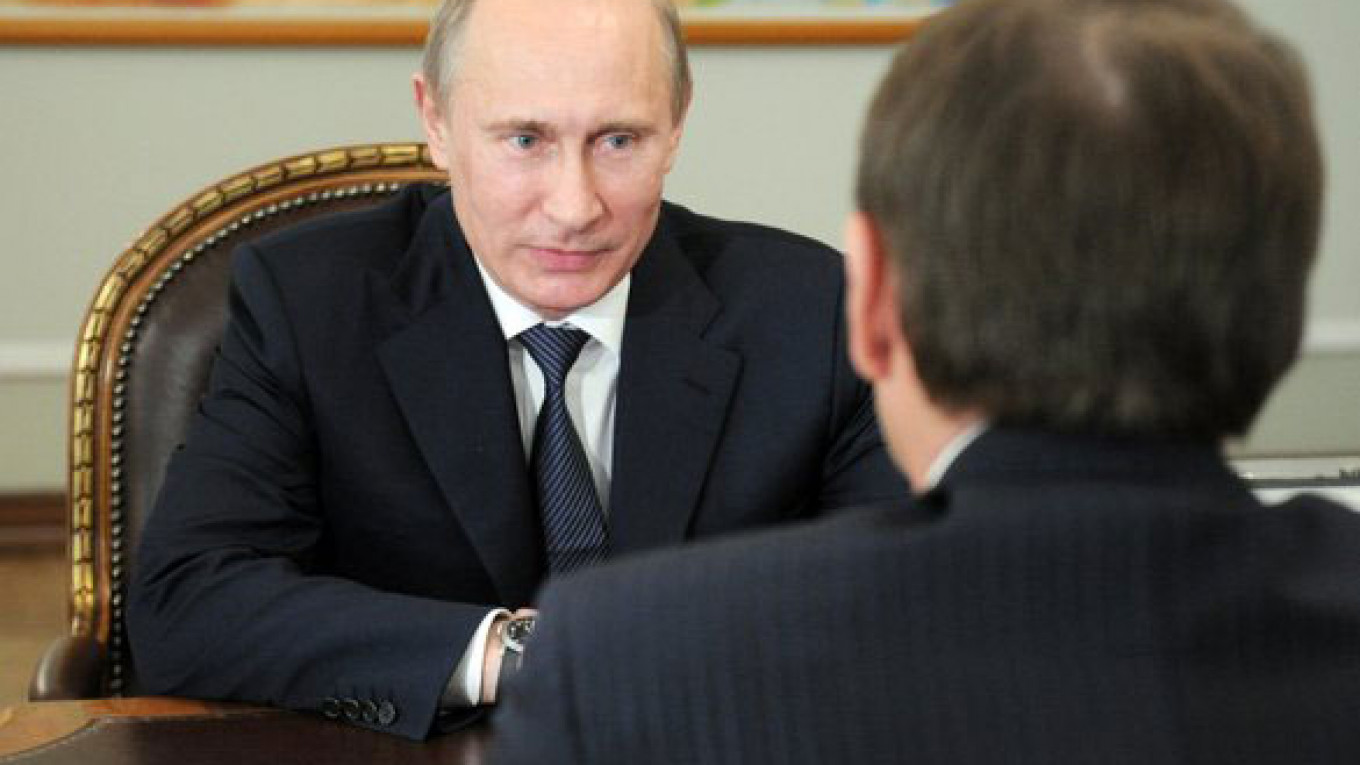President Vladimir Putin has established a council to oversee the country’s policy on ethnic relations, one of society’s most sensitive topics that has led to a rise in nationalist sentiment.
The council, according to the published presidential decree, will be chaired by Putin himself and will include Deputy Prime Minister Dmitry Kozak and the deputy head of the presidential administration, Vyacheslav Volodin.
The council will also be made up of several dozen specialists on policies dealing with ethnic issues and will consult with them on how to deal with the matter on a federal and regional level.
Setting up such a council was one of Putin’s electoral promises, and it was highlighted in an article he wrote laying out his policy platforms in the run-up to the March presidential election.
“Global tendencies show that the radicalization of young people and a non-regulated migration policy will remain key issues,” said Vladimir Zorin, the deputy head of the Institute of Ethnography and Anthropology.
“The creation of this council shows that pre-emptive steps are being taken,” said Zorin, who oversaw ethnic policy as a government minister without a portfolio from 2001 to 2004.
Zorin has agreed to become a member of the presidential council, which will be a bipartisan body that will include liberal-leaning television pundit Nikolai Svanidze and Culture Minister Vladimir Medinsky, who holds more conservative views.
Other council experts include the director of the Federal Migration Service, Konstantin Romodanovsky, the director of the Institute of Ethnography and Anthropology, Valery Tishkov, and former Rostov region Deputy Governor Viktor Vodolatsky, who is known for taking a harsh position against migrants as the head of the Modern Cossacks Union.
Zorin said that the participation of experts holding various political views in the council will allow everyone to “present their views without restrictions.”
Vladimir Mukomel, a professor with the Higher School of Economics and a noted specialist on ethnic issues, said that while the creation of the council was a “step in the right direction,” its advisory status will stop it from being a strong body.
“Authorities might choose to listen or ignore its decisions,” he said.
While Putin abolished a separate Nationalities Ministry during his first tenure as president, both he and Prime Minister Dmitry Medvedev suggested creating a structure to oversee ethnic issues in 2011.
The decision to create the panel comes 18 months after a riot by ultranationalist groups near the walls of the Kremlin that was triggered by the killing of a football fan in a brawl between ethnic Russians and North Caucasus nationals following a match.
An earlier presidential decree signed in December to create a strategy for government policy on national issues set several guidelines for controlling migration into the country. Among them is a plan to introduce Russian language exams by November and increase the punishments for illegal migration by December.
With the memory of a shared brotherhood of nations that held sway under the Soviet Union having faded, Russians have increasingly grown hostile to migrants not only from Central Asia but from Russian republics in the North Caucasus.
Differing sides on the issue agree that allowing illegal migrants to come into Russia in large numbers and then live in harsh conditions in crowded flats is also of deep concern. Ethnic and national divisions, combined with a backlash against migration from Central Asian states, are among the strongest challenges the country faces, analysts said.
According to a Levada poll conducted in 2011, 41 percent of respondents said that they support the slogan that is so often heard chanted by nationalists, “Russia for Russians.”
Some stated that the government’s lack of proper regulations has contributed to the rise of far-right groups who have anti-migrant agendas and commit crimes against foreign workers.
Nationalist agendas have not only found a home with far-right groups — opposition leader Alexei Navalny has also trafficked in nationalist rhetoric, authoring a popular slogan: “Stop Feeding the Caucasus,” which urges the Kremlin to end large subsidies to the North Caucasus republics.
Experts said that Putin, who once described himself as a “nationalist in a good sense of the word,” is trying to formulate a policy that would harmonize ethnic relationships within the country.
But Mukomel said that Putin has sent conflicting messages in the past. “Unfortunately, there were certain things he has said that could have been interpreted wrong, so there is a need for a firm, actual policy,” he said.
A Message from The Moscow Times:
Dear readers,
We are facing unprecedented challenges. Russia's Prosecutor General's Office has designated The Moscow Times as an "undesirable" organization, criminalizing our work and putting our staff at risk of prosecution. This follows our earlier unjust labeling as a "foreign agent."
These actions are direct attempts to silence independent journalism in Russia. The authorities claim our work "discredits the decisions of the Russian leadership." We see things differently: we strive to provide accurate, unbiased reporting on Russia.
We, the journalists of The Moscow Times, refuse to be silenced. But to continue our work, we need your help.
Your support, no matter how small, makes a world of difference. If you can, please support us monthly starting from just $2. It's quick to set up, and every contribution makes a significant impact.
By supporting The Moscow Times, you're defending open, independent journalism in the face of repression. Thank you for standing with us.
Remind me later.






